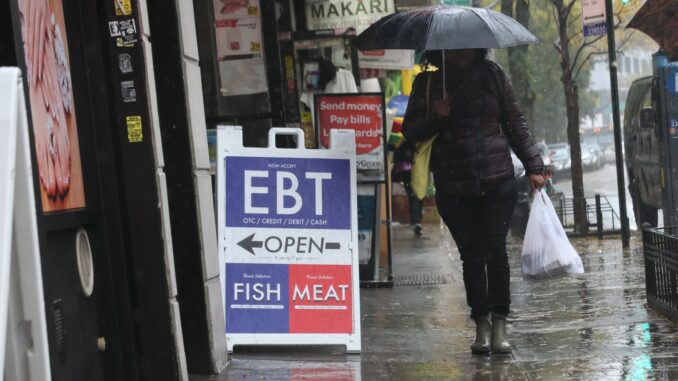
An EBT sign is displayed on the window of a grocery store on Oct. 30, 2025 in the Flatbush neighborhood of the Brooklyn borough in New York City.
Michael M. Santiago | Getty Images
The Trump administration asked a federal appeals court to issue an emergency block on a judge’s order that it pay 42 million Americans their full SNAP benefits for November by Friday as the federal government shutdown persists.
The administration requested that the 1st Circuit U.S. Court of Appeals allow it to pay 65% of the food stamp benefits this month from a contingency fund, as it proposed to the judge earlier this week.
The move came a day after Judge Jack McConnell issued an order in U.S. District Court in Rhode Island rejecting the partial payment option.
McConnell ordered that the U.S. Department of Agriculture use so-called Section 32 funds to help fully fund the SNAP benefits, along with the $4.65 billion it already planned to use from the contingency fund appropriated by Congress. The administration earlier had rejected the idea of using Section 32 funds for that purpose.
In its filing Friday with the appeals court, the Trump administration said that the “crisis” of the lack of regular funding for full SNAP payments “can only be solved by congressional action.”
Congress, since Oct.1, has repeatedly failed to pass a stopgap funding appropriation that would allow the government to reopen, and which would fully fund the Supplemental Nutrition Assistance Program, which helps feed about one out of every 8 Americans.
Justice Department lawyers wrote in the filing that instead of Congress passing new SNAP funding, “a single district judge has devised his own solution: ordering USDA to cover the SNAP shortfall by transferring billions of dollars that were appropriated for different, equally critical food-security programs —and to do so within just one business day (i.e., by today).”
“This unprecedented injunction makes a mockery of the separation of powers,” the lawyers wrote. “Courts hold neither the power to appropriate nor the power to spend. Courts are charged with enforcing the law, but the law is explicit that SNAP benefits are subject to available appropriations.”
Plaintiffs in the case responded later Friday, urging the appeals court to deny the administration’s request. The plaintiffs include a group of cities, charitable and faith-based non-profit groups, unions, and business organizations, who in a lawsuit last week asked McConnell to order officials to fully pay SNAP benefits.
The response said that the administration’s purported rationale for not tapping funds from Child Nutritionprograms is “facially implausible.” Those programs have “$23 billion on hand and require only $3 billion per month to operate,” the filing noted.
“Tapping Child Nutrition funds poses no realistic threat of leaving those programs underfunded,” lawyers for the plaintiffs said in their response. “The Administrative Procedure Act (APA) did not preclude the district court from entering a remedy for Defendants’ arbitrary and pretextual refusal to provide full funding to provide relief for children and families who are going hungry today.”
“Time is of the essence: the stay pending appeal and administrative stay should be denied
The administration last week said it planned to completely cease payments to SNAP recipients in November because there was no current funding appropriated for it.
Prior administrations have continued paying SNAP benefits during other shutdowns.
A group of cities, charitable and faith-based non-profit groups, unions, and business organizations sued the Trump administration, asking McConnell to order officials to fully pay SNAP benefits.
On Oct. 31, McConnell ordered the administration to pay at least partial benefits from the contingency fund as soon as possible, and to investigate whether other funds could be used to help pay for the full benefits.
The administration on Monday told McConnell it would pay 50% of SNAP benefits for November by using the contingency money, but said it would not use other funds. On Wednesday, the administration told the judge that a review of the contingency funds available meant that 65% of the benefits could be paid.
Plaintiffs in the case said that was not acceptable and asked McConnell to order that full benefits be paid.
McConnell agreed, telling administration lawyers at a hearing on Thursday, “People have gone without for too long.”
“The evidence shows that people will go hungry, food pantries will be overburdened, and needless suffering will occur” if SNAP is not fully funded, the judge said.
“While the President of the United States professes a commitment to helping those it serves, the government’s actions tell a different story,” McConnell wrote in a subsequent written order.
This is developing news. Please refresh for updates.





Be the first to comment